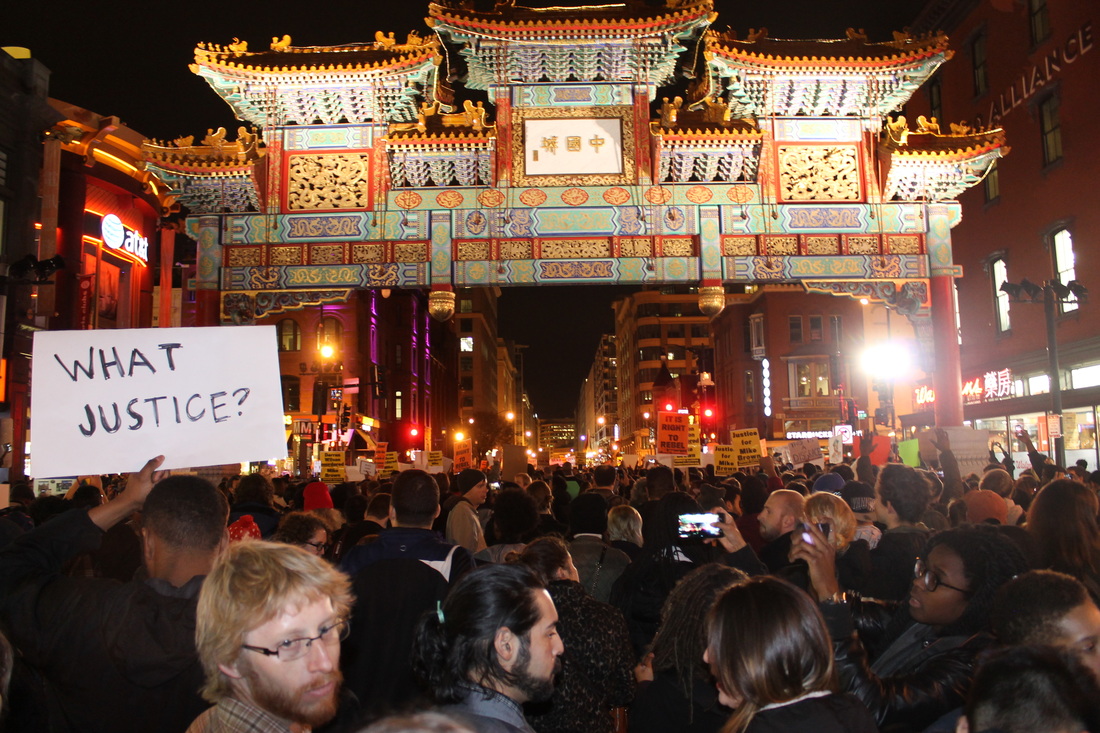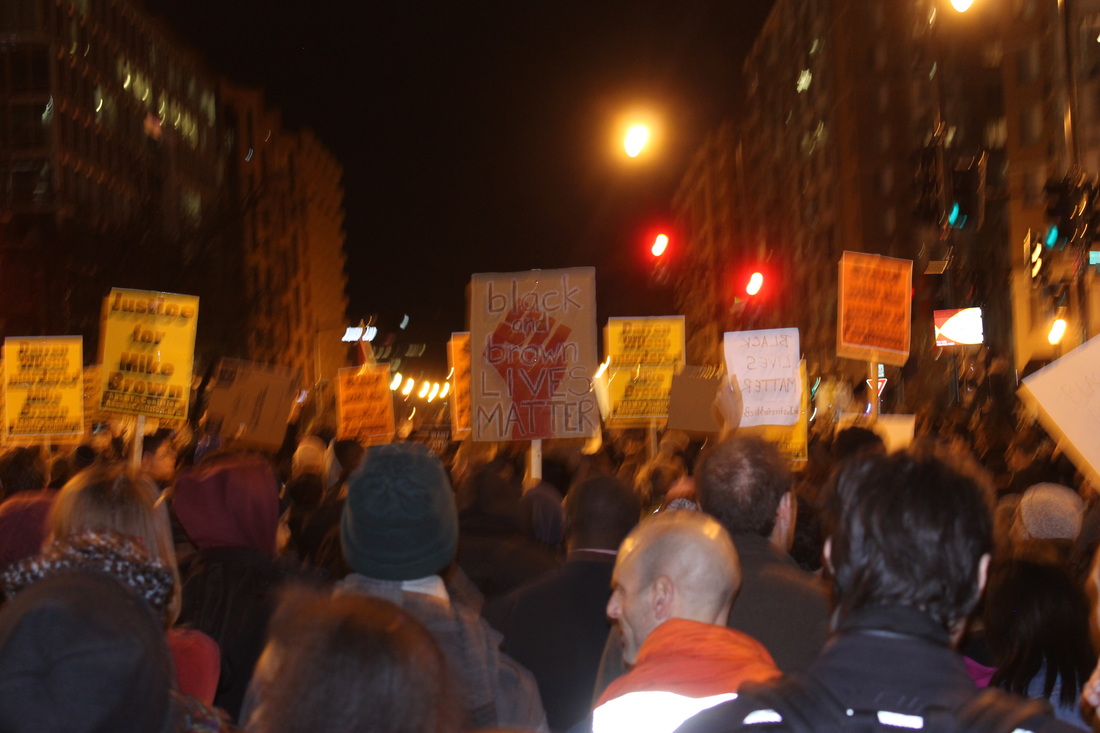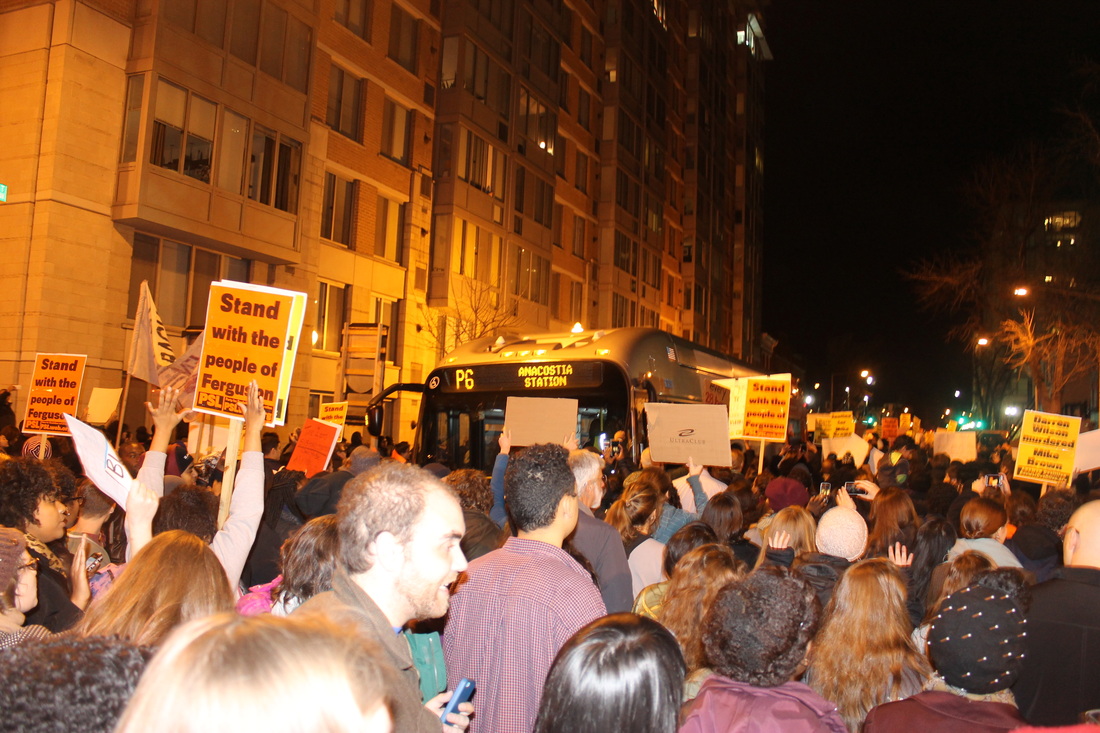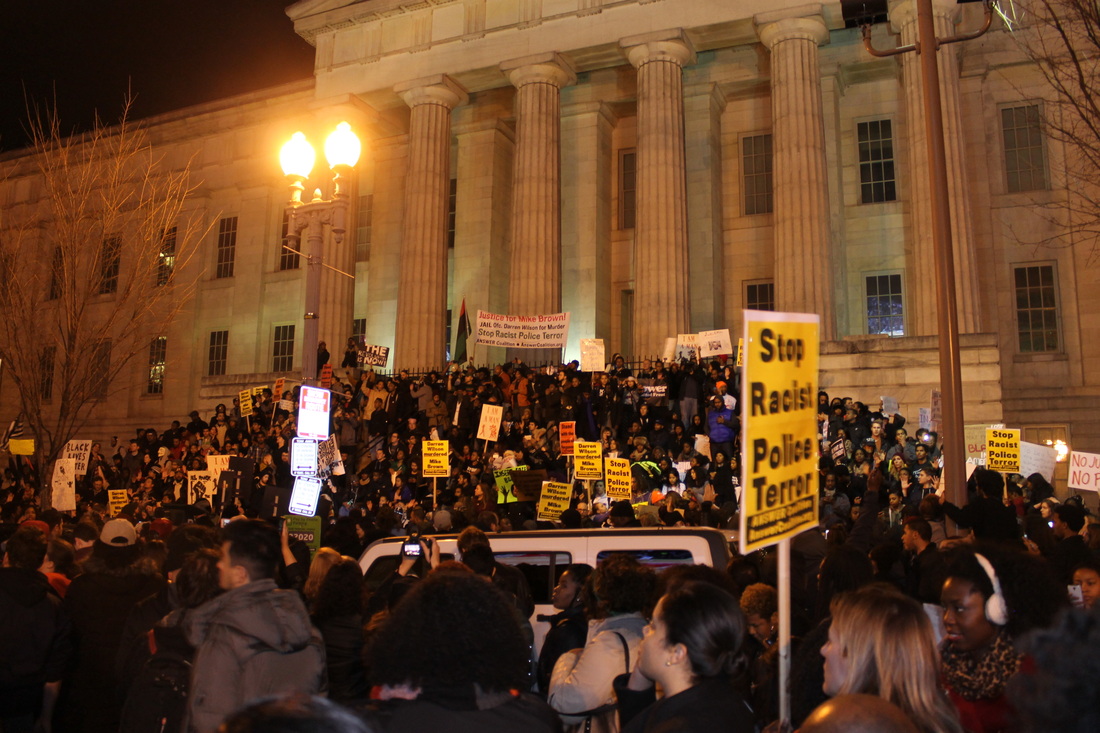|
The Breadcrumbs widget will appear here on the published site.
How To Be A White Person In A Black Space Words and images by Kate Hickey QuailBellMagazine.com At the November 25th protest rally for the failure to indict Darren Wilson for the murder of Michael Brown, I saw a sign that said, “We all bleed red.” It was a pretty well-made sign—colorful, straightforward, simple, and aesthetically pleasing. And it really rubbed me the wrong way. The rally met at Mt. Vernon Square, and when I arrived right on time at 7 p.m., there were already at least a hundred people chanting, yelling, waving their signs, and getting pumped up for the march. There were organizers taking people’s information to keep everyone in the loop. By the time we began to march, there were upwards of a thousand people. At first, I felt uncomfortable and awkward. I’m white. I am not Mike Brown and I will never suffer what he suffered, or what countless other Black men and women suffer at the hands of a racist society. I felt that dissonance. I was clearly not among “my” people. But when the speakers started, I relaxed. I listened. I became one among hundreds of people who believe that justice was not served for Mike Brown. I faded into the background, became insignificant but for the fact that I was there. And that’s exactly where I needed to be. Unfortunately, because of the varying noise levels, I didn’t catch the names of the speakers at the rally. But each of them made wonderful statements that I did get some notes down about. One of the speakers gave out a huge volume of information. Some was about local and national organizations that are working to bring about justice for Mike Brown. Organizations like the Black Youth Project, the National Black United Front, ONE DC, and #DCFerguson—all of whom where involved in the planning of the rally. Another disturbing piece of information was about how frequently Black people are murdered at the hands of the police. One Black person is shot every twenty-eight hours by a police officer in the United States. According to the FBI’s definition, that’s terrorism. It’s genocide. “This happens everywhere,” said the speaker. One of the speakers sounded as though she was close to tears as she shouted into her megaphone that, “Black lives matter.” There was immediate applause. The rally was inarguably a huge success. Everything went off without a hitch, except for the fact that the microphone was rather inadequate for the size of the crowd. There were shouts from behind me of “MIKE CHECK!” and “LOUDER!” until the crowd together reached a better conclusion. The speaker would say a phrase, and we would all shout it out back in unison. They asked us to organize anger into power to make change, to video tape police in order to keep them accountable for their actions, to boycott Black Friday sales in protest, and in unison, we all said it back. “Tell them that Black lives matter.” When the march itself began, the chants were a little all over the place as we walked from the small park onto the streets. At one point, I was in a small bubble of people who weren’t chanting, but around us I could hear variously timed shouts of, “Don’t shoot! Don’t shoot! Don’t shoot!” It chilled me to the bone because that’s the reality of it all: In the moment, it’s not a rhythmic mantra designed to make a strategic political point. It’s a quick shout of fear, of desperation. And while I felt safer in that crowd than I do riding the Metro sometimes, I finally understood the intensity and significance of, “Don’t shoot.” There were hundreds of people toting signs, all saying wonderful things that called out the injustice of our country. There were demands for justice, inspiring messages, and statements of solidarity between racial communities. Some had quotes from frontrunners of the last generation: Malcolm X, James Baldwin, Martin Luther King, Jr, and more. And there was another that caught my attention: The Revolution is Now. In fact, there was a lot of discussion about the last generation, the Civil Rights Movement generation. The speakers talked about how their ancestors fought the injustices of the 1950s and 60s to end segregation and ensure voting rights for Black Americans. And then one of the speakers finally said it: “I respect my ancestors. But where’s our movement?” We are the only generation who can change this country. The crowd last night was primarily young people in their twenties. The people who fought in riots and got hosed down in the South in the 1960s were young people. “It’s young people who make the changes. It’s young people who make the revolutions,” said the speaker and the crowd erupted into cheers. Millennials have been treated as if our opinions, our experiences, our knowledge is worthless. According to the “adults” who run the world, we’re still idiotic kids who don’t understand the world. But the fact of the matter is, we do understand the world, and we don’t like it. So we are going to change it. We are going to shut it down, just as the sheer volume of people in the streets shut down Chinatown last night. And in case you were worried, there is a place for white people in this pro-Black movement. That place—our place—is one of silent solidarity, because we have been the voice of the people for centuries. Since this country was created, white people have been calling the shots, making all of the decisions. And a lot of the time, those decisions had intentional negative consequences for people of color. So now it’s time for us to shut up and stand behind those whose time has come. Obviously, that’s hard for white people because we’re all very used to doing and saying whatever we want with very limited consequences. But we must stand back and let Black leadership rise. This is their movement, their community under attack, and their pain. What we can do is offer support. We can call out other white people. We can document and spread and attend and chant. But it’s not our place make statements, talk to the news, or—especially—to define the movement. And more people are behind this movement than those in power seem to think. It’s not just the “dumb kids,” even though we make up the biggest group. As we walked across H Street, shouting and chanting and cheering, people came out onto their balconies and cheered along with us. They waved and yelled. One woman—an old lady, really—was hopping up and down with joy. I was far away from her, but I’m sure I saw the smile on her face. She saw us, a deluge of people on the street below, screaming for justice for a young Black man who could’ve been any young man in her own family. I want to remember her, and I want to fight against injustice in her place, because she is old and she probably can’t. And, again, that is my place. White people do need to be on the front lines, but not as any leader. Not as a name that will go down in history. As the first line of defense, white people must become a wall of solidarity and support to keep the Black citizens of our country who are under attack safe. Otherwise, what is the point of us all bleeding red? I saw another sign, towards the end of the rally. It said, “We all bleed red. So why is only Our Blood on the street?” Just some food for thought on Thanksgiving. #Racism #MikeBrown #Protests #Feminism #Solidarity #United #DCFerguson #Ferguson #WashingtonDC #DC Visit our shop and subscribe. Sponsor us. Submit and become a contributor. Like us on Facebook and follow us on Twitter. CommentsComments are closed.
|
|













